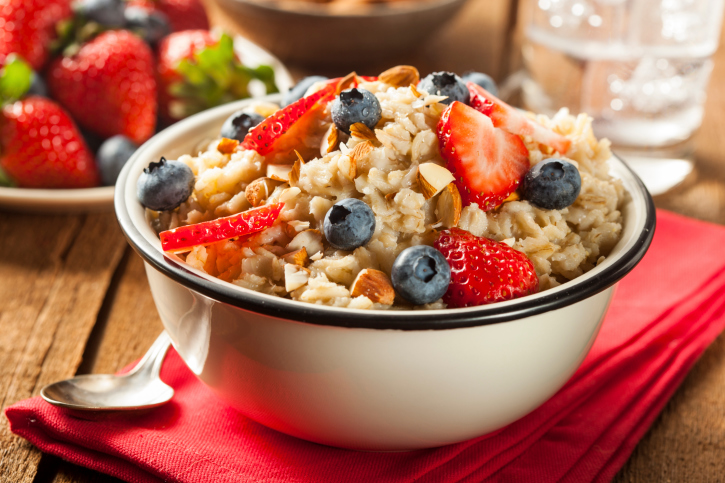You’ve probably heard the phrase “breakfast is the most important meal of the day.” But why exactly is breakfast so important? There is a strong correlation between eating breakfast and maintaining a healthy weight. According to the National Weight Control Registry, 78% of its members who are able to maintain weight loss eat a balanced breakfast each day. Skipping meals can often lead to poor food choices made out of excess hunger. For most individuals, especially growing children and teens, breakfast can also help improve cognitive function and concentration. Your body needs fuel to function, so it’s important to nourish it with the right foods.
Try these tips for building a balanced breakfast:
- Include complex carbohydrates. Complex carbs are slowly digested, often due to their high fiber content, and are commonly found in plant foods like whole grains, beans, lentils, starchy vegetables, and certain green veggies. Unlike the refined carbs found in many processed foods (pastries, donuts, sugary breakfast cereals), the fiber content of various complex carbs will help keep you fuller for a longer period of time. A good fiber choice usually has at least 4 grams of fiber per serving with little to no added sugars. Oatmeal and whole-grain (low-sugar) breakfast cereal are some good carb choices to start your day.
- Add a lean protein source. On its own or when paired with a complex carb, protein can really help fill you up and satisfy hunger throughout the morning. Nutritious protein sources include eggs, tofu, peanut or other nut butters, low-fat dairy, fish, and lean meats.
- Don’t skimp on fruits and vegetables. Most people are lacking when it comes to the suggested fruit and/or vegetable servings per day (1.5 to 2 cups fruit, and 3 cups vegetables). Fruits and veggies are nutritionally dense and will fill you up on fewer calories. The sky is the limit when it comes to breakfast options. Adding fruit to cereal or yogurt or some veggies to an omelet or breakfast bowl will help round out your breakfast.
Here are some healthy breakfast ideas to get you started:
- Fruit parfait: Layer low-fat plain yogurt with low-sugar granola or whole-grain cereal, with fresh or frozen fruit.
- Cook up some plain oatmeal and get creative with toppings. Peanut butter, sliced almonds, dried or fresh fruit, pumpkin puree and cinnamon—the options are endless.
- Breakfast bowl: Combine some black beans, scrambled eggs, fresh salsa, and avocado slices for a filling meal.
- Breakfast pizza: Toast some whole grain bread and top with ricotta cheese, basil (fresh or dried), tomato slices, a drizzle of olive oil, and some salt and pepper.
- Avocado toast: Top whole-grain toast with mashed up or sliced avocado. For some extra protein, add an egg cooked your favorite way.
Want more healthy breakfast ideas? Browse these recipe collections:
- Breakfast recipes: http://www.eatingwell.com/recipes_menus/healthy_breakfast_recipes
- Healthy breakfasts for busy mornings: http://greatist.com/health/healthy-fast-breakfast-recipes
- Veggie-packed breakfast ideas: http://greatist.com/eat/healthy-breakfast-recipes-with-vegetables
- Smoothies under 250 calories: http://www.cookinglight.com/eating-smart/smart-choices/low-calorie-smoothies/view-all
For Health Advocate Members
If you’re a Health Advocate member with access to our Wellness Coaching program, call your coach for more helpful nutrition tips!




[…] with a healthy breakfast: This will help you stay energized and feel good. Find breakfast ideas here. Anxious to get to the store? Try one of these grab-and-go breakfast […]
[…] will help you stay energized and feel good. Find breakfast ideas here. Anxious to get to the store? Try one of these grab-and-go breakfast […]